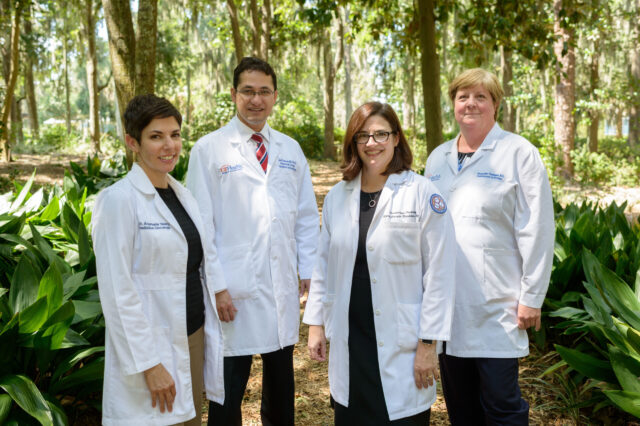At UF Health, our physicians treat patients with cancers of the uterus, cervix, vagina, ovary, fallopian tube and vulva using the latest diagnostic, treatment and surgical techniques.
Our multidisciplinary treatment team includes physicians, nurses and staff who are experts in gynecologic cancer. The exchange of knowledge and opinions among team members means that patients benefit from the combined expertise of multiple cancer specialists from many disciplines who carefully review patient information and develop the best possible treatment plan for each individual.
Gynecological cancer services and treatment
- Integrated clinical experience
- Prevention and screening
- Medical oncology
- Radiation oncology, including chemotherapy and radiation
- Surgical oncology
- Pathology
- Radiology
- Fertility preservation
- Genetic counseling
- Patient educators and resources
- Personal wellness and rehabilitation programs
- Psychosocial support
- Palliative care
Comprehensive patient care
With over 50,000 patient visits a year in our clinics and services across labor and delivery, gynecologic surgery, oncology and infertility, UF Health Obstetrics and Gynecology is a very busy and highly successful department. Even with such a busy clinical service, we have been able to maintain a highly personalized approach to each patient and were recently awarded a five-star award for patient satisfaction.
The Division of Gynecologic Oncology’s predominant area of research has been clinical with emphasis on the management of ovarian malignancies with radioactive phosphorus, also known as P-32, and various chemotherapeutic trials in ovarian and cervical cancer. This active research program puts us in a unique position to offer patients the latest innovative technology and state-of-the-art treatment options, including:
- Minimally invasive surgery
- Traditional surgery
- Reconstructive surgery
- Chemotherapy
- Radiation therapy
- Fertility preservation
Gynecological cancer signs and symptoms
Early detection examinations
Since most gynecological cancers do not show symptoms until late in development, it is important for women to have annual examinations for early detection.
Early examination tests include:
Types of cancers
- Cervical carcinoma is one of the most common cancers among women. There are an estimated 16,000 new cases of invasive cancer of the cervix and 5,000 deaths in the United States each year.
- Uterine carcinoma is the most common cancer in the United States among women. Risk factors include obesity and estrogen stimulation.
- Vuvlar carcinoma is relatively rare and highly curable when diagnosed in an early stage. The incidence is two per 100,000 women. Risk factors include chronic vulvar irritation and sexually transmitted diseases.
- Ovarian and fallopian tube carcinoma is a cancer of the ovary and fallopian tube remains difficult to diagnose. Ovarian cancer ranks fifth in cancer deaths among women, totaling more deaths than any other cancer of the female reproductive system.





